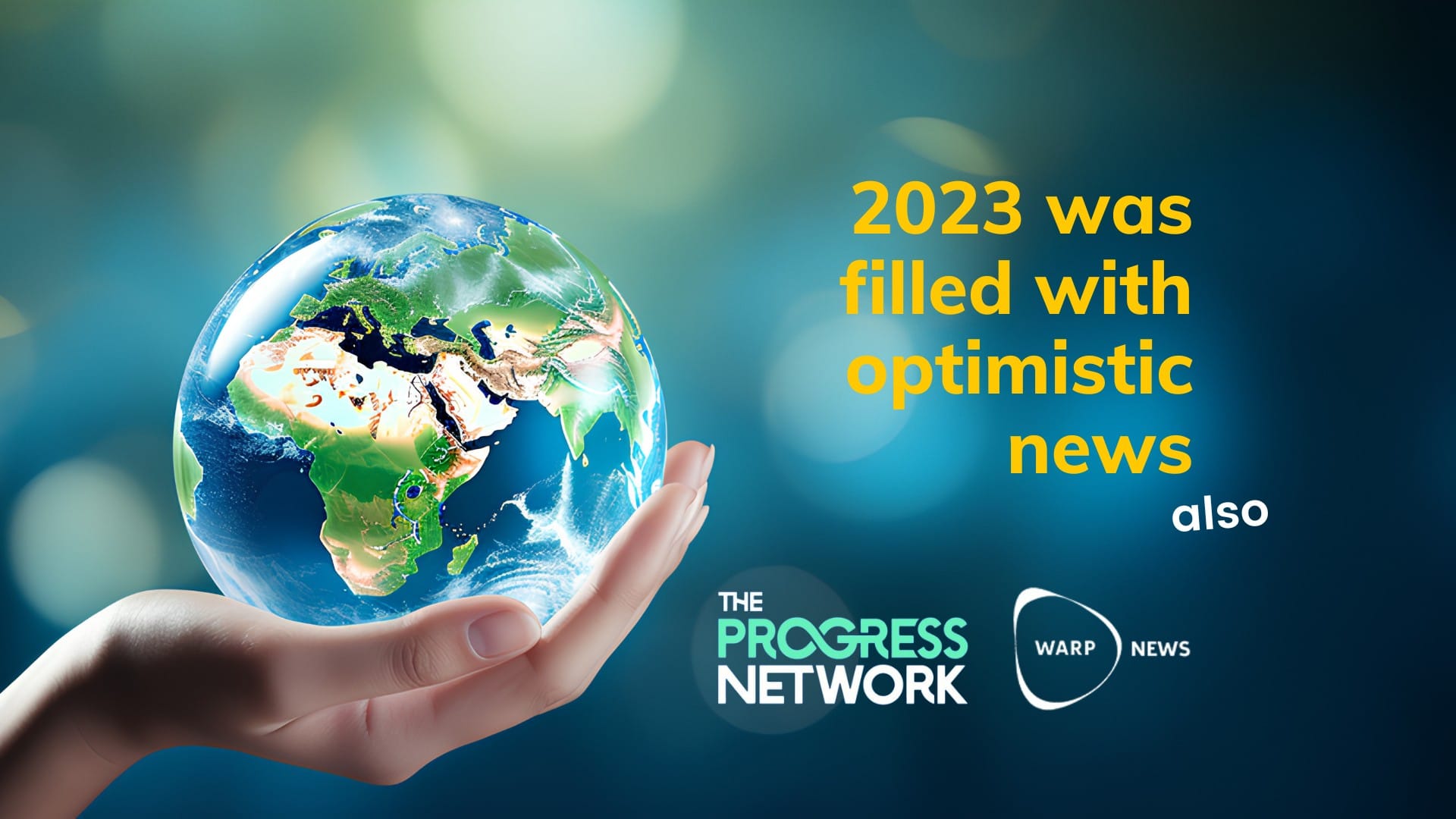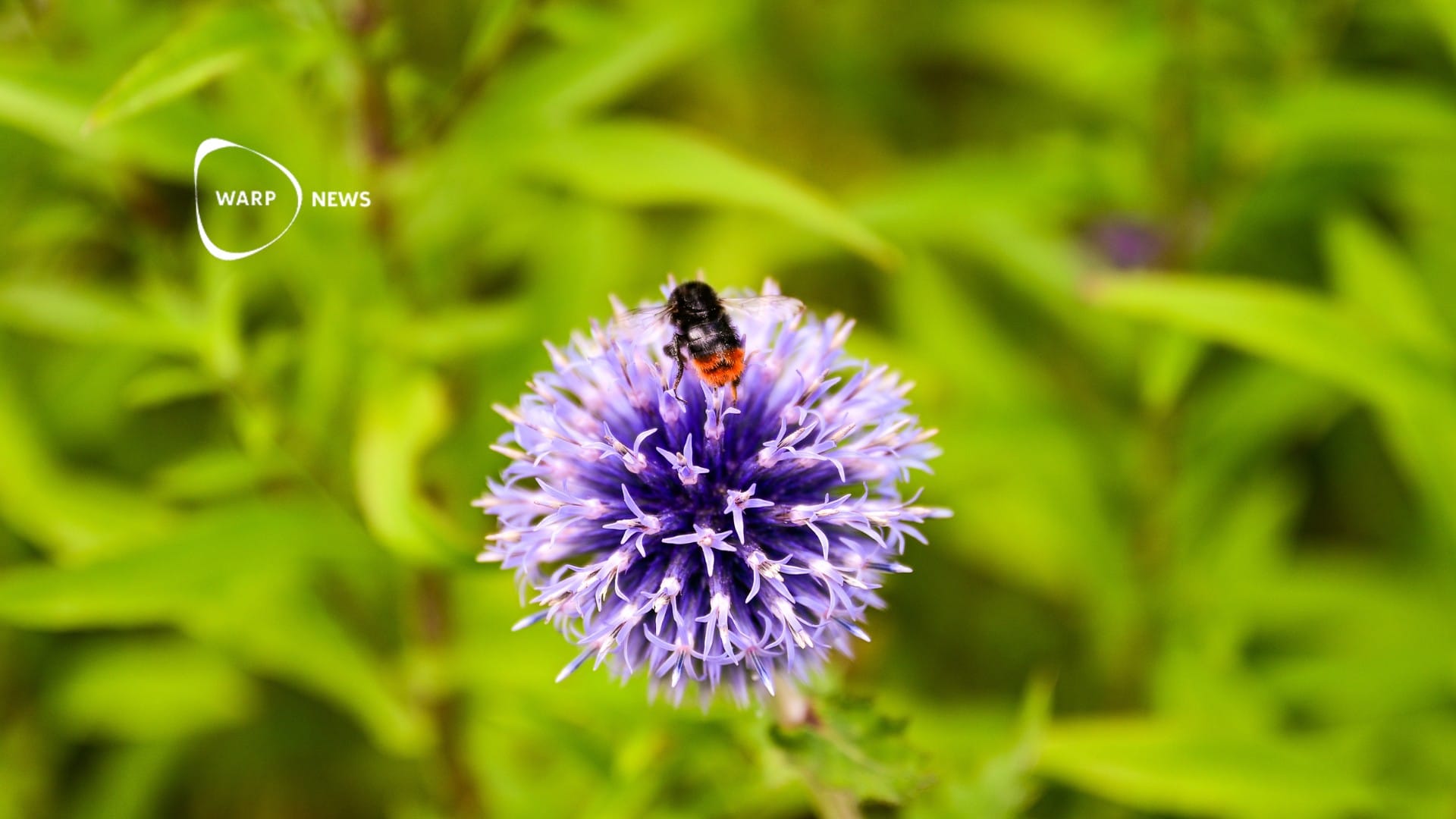
💡 Hopescrolling: 52 fact-based optimistic news from every week in 2023
What were the biggest news stories of the year? If you look at mainstream media, except for Taylor Swift’s Eras tour, they were all disasters. But 2023 was also full of optimistic news. Not as loud, but oftentimes just as important.
Share this story!
What were the biggest news stories of the year?
If you look at mainstream media, except for Taylor Swift’s Eras tour, they were all disasters. Ongoing war in Ukraine. The terrorist attacks in Israel and the subsequent war in Gaza. Deadly earthquakes in Turkey and Syria. The dayslong search, and eventual explosion, of the Titan submersible. Record-breaking temperatures across the globe.
At Warp News, however, we specialize in covering the news stories that are not as loud, but oftentimes just as important.
As 2023 comes to a close, here are our seven picks of the biggest steps forward from the year, in collaboration with our friends at The Progress Network. We have also included three of our editorial favorites from TPN and Warp.
Warp News and The Progress Network
This optimistic summary of 2023 is a collaboration between Warp News and The Progress Network.
The Progress Network is building an idea movement that speaks to a better future in a world dominated by voices that suggest a worse one. They have a weekly newsletter, What Could Go Right?
Warp News also has a weekly newsletter, with fact-based optimistic news on technology, science and human progress.
You can sign up - for free - for both of our newsletters.
Top 10 of 2023
1) Two new malaria vaccines save lives
Distribution of the world’s first malaria vaccine, RTS,S, is being scaled up, and is already making a difference. In October, the World Health Organization (WHO) reported figures from a pilot program of the vaccine which showed a 13 percent reduction in deaths among young children.
Also in October, the WHO approved a second malaria vaccine, R21, which is both more effective and cheaper to manufacture than RTS,S. First doses are expected to arrive in malaria-stricken countries in 2024.
In November, a Kenyan pharmaceutical company became the first in Africa to be granted approval to manufacture a high-demand malaria drug, normally imported from India and China.
Belize, Tajikistan, and Azerbaijan were declared malaria-free.
2) CRISPR becomes real
The United Kingdom became the first country in the world to approve a treatment that uses the gene editing tool CRISPR. Casgevy is a therapy for blood diseases sickle cell and beta thalassaemia. While not a cure, it may treat symptoms for a lifetime and could be a replacement for those ineligible for a bone marrow transplant.
Bahrain and the United States both followed quickly in the UK’s stead.
3) Climate change gets worse, but also better
During the hottest year on record, it may seem odd to talk about what went right vis a vis climate change. But plenty did, even as global emissions have not yet declined. In 2023:
- Electric vehicle and heat pump sales soared
- Renewable energy installation surged
- Renewable energy investment broke records
- It is expected that coal consumption peaked
- The Ukraine war turbocharged Europe’s green transition
- Annual climate meeting COP28 yielded a loss and damages fund for poor countries
4) Artificial intelligence (AI) enters the chat
The introduction of AI into, well, everything, is going to be a gamechanger for many aspects of our lives. And while there is plenty to be concerned about, there are also plenty of ways that AI is helping create a better world, from discovering and designing new drugs to helping doctors with patient notes to language learning.
One enormous AI success this year was its find of a new antibiotic, abaucin. It kills Acinetobacter baumannii, a superbug that plagues hospitals and nursing homes and causes blood, lung, and urinary tract infections.
Humans aren’t the only organisms that are evolving with the times; bacteria, too, are passing along genetic material, says the WHO, that increase resistance to antibiotics. But it takes time to screen antibacterial molecules by hand. AI greatly speeds up the process.
P.S. In case you’re among the worried crowd, know that 50 percent of AI researchers don’t actually think that AI has a 10 percent chance of killing us.
5) We’re moving past the Covid pandemic
In May, the WHO decided that the Covid pandemic was no longer a global health emergency. While the declaration doesn’t alter the reality of continued cases across the globe, it does signal an end to the years of unnatural living with social distancing, lockdowns, and travel restrictions.
And, low- and middle-income countries that were rocked the most by Covid’s economic challenges have on average recovered to pre-pandemic levels of poverty, says the World Bank. This is comforting news after the pandemic “led to an unprecedented reversal of consistent decline in global poverty.”
6) Conservation successes
The Saiga antelope, which has been living on planet Earth since the Ice Age, has been moved from Critically Endangered to Near Threatened on the Red List, which tracks species’ extinction risk.
The antelope’s return has been primarily in Kazakhstan, where in 2005, populations dropped to a mere 39,000. They now number nearly two million.
But the Saiga antelope is just one of many conservation successes that occurred this year. Halfway through the year, we had already counted over 50 animal comebacks, including of whales, lions, butterflies, and tigers.
7) The first sample of a deep space object
Why is planet Earth habitable? The answer, say scientists, may lie on asteroids like Bennu, four billion miles away from us. After seven years in deep space, this fall, material scooped off the asteroid was successfully returned to NASA, so it could be studied for the first time.
NASA confirmed the sample “show[s] evidence of high-carbon content and water, which together could indicate the building blocks of life on Earth may be found in the rock.” Scientists think that billions of years ago, asteroids may have delivered the material that eventually resulted in Earth’s air, water, and life forms.
8) Investigation: There is no sixth mass extinction going on
Have half of all the earth’s species really gone extinct? The Progress Network and Warp News teamed up this year to fund an investigation into claims that we’re going through a sixth mass extinction. What reporter Anders Bolling uncovered, however, is that scientific research of a mass extinction uses theoretical models of insects and even smaller organisms—numbers that are impossible to verify.
Among larger species, population numbers vary by region. On the whole, however, humans are far more concerned about, and better equipped to deal with, biodiversity efforts now than in the past.
9) The year in newsletters and podcasts: Poverty on its way out, green energy in
There are ongoing, sweeping changes that are so slow-moving that they are lost beneath the shuffle of a fast-paced news cycle. We covered many of these this year in TPN’s weekly newsletter, What Could Go Right?, and our podcast of the same name.
We have cut global AIDS-related deaths by over half in the past two decades, for example. Child mortality rates all over the world continue to fall, as well as poverty rates.
On our podcast, we spoke about the finances behind the US’ green transition and why the gender parity discussion may need an update.
10) Warp Levels: An idea to level up humanity
When we envision what we want to achieve and pull together to do it, we can achieve incredible things in a short time. The moon landing in the 1960s. The Covid vaccines in 2020. The UN's Millennium Goals helped lift a billion people from extreme poverty.
But what should the next phase of humanity’s progress look like? It’s not a phase, but many phases, says Mathias Sundin, founder of Warp News. We could be banding together to achieve currently unimaginable things, from Mars colonization to harnessing star energy to mastery of space-time manipulation.
2023 was full of optimistic news (also)
Here, we have selected one news item per week, but together Warp News and The Progress Network have published over 500 positive news during the past year.
As you can see below, these are not cute stories, but events, breakthroughs, and progress that improve the world.
January
❌ Guinea worm disease is almost gone
🗳️ New study: No evidence of democratic decline
💊 New skin cancer treatment more effective than expected
February
🎗 33 percent fewer deaths from cancer in the US in 30 years
🦏 Rhino poaching falls to zero in large Indian reserve
🌍 EU knocked a decade off their decarbonization timeline
🌊 The first international agreement for ocean protection since 1982 is signed
March
🦟 Azerbaijan and Tajikistan declared malaria-free
🌡️ Global heat pump sales see double-digit growth
🧒 Children's lung health has improved and urban air has become cleaner
💰 Electric vehicles surpass $1 trillion in global sales
April
💉 Fewer child deaths, thanks to new vaccine
🚗 First time: An EV is Europe's best-selling car
🚭 US adult smoking hits all-time low
🥇 Graphene just broke another physics record
May
🐬 Critically endangered porpoise on the road to recovery
🗳️ Support for democracy is very high - and increasing over time
📉 Child marriage is on the decline
💉 World’s first RSV vaccine is approved
June
🦟 Belize declared malaria-free
🏳️🌈 Estonia legalizes same-sex marriage
🧭 New study: Morality not in decline
🏭 Global climate emissions no longer on worst-case trajectory
July
🌏 Global inequality is actually decreasing
🎨 AI art generation creates a revolution in protein design
🛢️ US destroys its chemical weapons stockpile
August
🐝 The global population of honeybees is fine
🎮 Violent video games don't make children aggressive
🌊 Less plastic in the oceans than presumed, says Dutch researcher
September
🔌 Record global access to electricity
😊 New survey: Americans satisfied with their lives
📉 Canada has almost eliminated poverty
📶 Record number of internet users, two-thirds are now online
October
👵 Dementia has started to decline
👧 50 million more girls in school
💉 Egypt has almost eliminated hepatitis C
🌳 Deforestation is reversing in Brazil
November
🏭 China’s emissions set to fall in 2024, says report
🍛 Bangladesh has added an additional year of healthy life for just $1
🔋 Northvolt's new battery needs less rare minerals
📉 Over 200,000 annual deaths averted through lower carbon emissions
December
🏆 XPRIZE aims to add 10 healthy years of life - $101 million in prize money
💊 UK, US, and Bahrain approve CRISPR therapy to effectively cure sickle cell disease
🎨 Thousands of stolen art items are returned
👩💻 New studies: No negative mental health impact from internet and social media
By becoming a premium supporter, you help in the creation and sharing of fact-based optimistic news all over the world.


